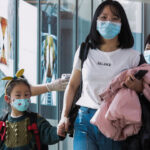
2021 is here. Many Nigerians wish to lead better lives in 2021 than they had in 2020. What are the recommended best diets and lifestyles Nigerians should adopt in 2021 for optimal health? What are the best New Year Resolutions, nutrition and health wise, Nigerians should make and how they could keep on with them?
Scientists have advanced in novel diets. Top on the list are: new research finds ginger counters certain autoimmune diseases in mice; Mediterranean diet may decrease risk of prostate cancer progression; Glycyrrhizin in licorice root neutralises Severe Acute Respiratory Syndrome Coronavirus type 2 (SARS-CoV-2) in vitro by inhibiting main protease Mpro; and Vitamin D supplementation found to reduce COVID-19-related mortality.
The Mediterranean diet is high in vegetables, fruits, legumes, nuts, beans, cereals, grains, fish, and unsaturated fats such as olive oil. It usually includes a low intake of meat and dairy foods.
Licorice root, which is considered one of the world’s oldest herbal remedies, comes from the root of the licorice plant (Glycyrrhiza glabra). Glycyrrhizin is a triterpenoid compound that accounts for the sweet taste of licorice root and represents a mixture of potassium–calcium–magnesium salts of glycyrrhizic acid.
SARS-CoV-2 causes COVID-19.
A consultant public health physician and Executive Secretary, Enugu State Agency for Control of AIDS (ENSACA), Dr. Chinedu Arthur Idoko, told The Guardian that with the widespread pandemic of COVID-19 it is most pertinent that every avenue of boosting immunity to assist averting the pervading infection or ensuring an efficient host response to the virus is maintained.
Idoko said a good diet remains principal to achieving this, and a healthy living in general. “Fresh vegetables and fruit based diets is highly desirable. Food and diet that encourage obesity should be stepped down as it invariably directly or indirectly inspires underlying disease conditions like hypertension, diabetes etc.
“It is important to note that Vitamin C boosts immunity substantially and fruits have a huge domicile of vitamin C. Fruits and vegetables are therefore hugely essential and should form a focus of resolve to a healthy living in the New Year,” he said.
President, African Fertility Society (AFS), Joint Pioneer of In Vitro Fertilisation (IVF) in Nigeria and Medical Director, Medical Art Centre (MART) Maryland, Lagos, Prof. Oladapo Ashiru, told The Guardian that there are several priorities to a good dietary nutrition.
Ashiru said too much food leads to mal-digestion, constipation, and bloating. He said a balanced diet of protein, carbohydrates, and fats in a ratio compatible to one’s body are good.
The physician added: “The food of a fisherman is poisonous to a Blacksmith. So it is important to know your food allergies and those compatible. Chew your food very well at least 30 to 60 times, and slowly. It would prevent congestion, constipation and intestinal autointoxication.
“According to Dr. Mayr, Intestinal auto intoxication that is caused by improper eating is the cause of virtual all systemic diseases, ugliness, and premature death.
“It is better to take good amount of water or other fluids at least 45 minutes after eating than during eating to allow for proper digestion. Once you recognize these priorities you would be fit, happy, energized, and healthy.”
A public health physician and Executive Director, National Primary Health Care Development Agency (NPHCDA), Dr. Faisal Shuaib, told The Guardian that adequate nutrition is critical for a strong immune system and key to building immunity, required for the management, treatment, and recovery from diseases.
Shuaib said the importance of good nutrition in supporting immune function could never be over emphasised, as nutrition is a key determinant of health, the nations’ development and part of a treatment regimen for acute and chronic diseases.
He said with the unprecedented second wave of COVID-19 disease, it is important that Nigerians start the year on a healthy note in a bid to shore up their immunity and builds their resistance. “Unfortunately, we are also witnessing a rise in the burden of non-communicable diseases, coupled with the already existing high burden of communicable diseases called epidemiologic transition of disease or double burden of disease in scientific circles. Also, worthy to mention is the alarming increase in obesity a form of malnutrition, which ignorantly is seen as a status symbol of good living. All these above mentioned are linked with nutrition and lifestyle,” Shuaib said.
The NPHCDA boss said the burdens of under-nutrition, obesity and micronutrient deficiency can be attributed to dietary changes associated with rapid urbanisation, more sedentary lifestyles, and increased consumption of “refined” foods with minimal nutrition value leading to obesity and diet-related non communicable diseases. Also, the public health physician said climate change; COVID 19 pandemic, natural severe weather events are resulting in frequent food crisis, with subsequent increased incidence of food insecurity and food price instability.
He said the emergence of chronic diseases in Nigeria could be linked to nutrition misinformation. Shuaib said poor food choices are often based on nutrition ignorance, misconceptions, and superstitions, religious, cultural and unscientific beliefs. These lead to poor dietary patterns and lifestyle that ultimately influence health outcomes.
The physician said under-nutrition could affect the effectiveness of vaccines. He explained: “The antibody responses to immunization with viral vaccines can diminish with poor sero-conversion rates in severely under nourished children hence, children can be sero-negative to oral polio virus vaccine due to under-nutrition.”
Shuaib said under-nutrition, malaria and anaemia have strong association and co-exist frequently affecting women and children. “Nutrition and Human Immuno-deficiency Virus (HIV) are strongly related and complement each other. A malnourished person after acquiring HIV is likely to progress faster to Acquired Immune Deficiency Syndrome (AIDS), because under nutrition reduces the capacity of the body to fight infection by compromising the immune system. Under-nutrition can affect food production and productivity in the workplace,” he explained.
Shuaib said the Federal Government of Nigeria through NPHCDA is committed to eradicating hunger and malnutrition, which is crucial to achieving optimal nutritional status for all Nigerians and for socioeconomic development of the nation.
He added: “My first recommendation would be to go back to our roots. Before the advent of westernization, we ate more of natural foods, (these are foods that have not been processed, refined, or have no additives or preservatives).
These foods have been shown to be healthy as they are nutrient dense, abundant in vitamins and minerals, fiber, phytonutrients, and the essential classes of food, which act as our body’s defense against infections and diseases. On the contrary processed foods are full of ‘empty calories’ and tend to be low in fiber and phytonutrients and these play a role in the development of non-communicable diseases including obesity.
“It is worthy to mention that going back to our roots does not include the consumption of herbal concoctions of unknown substances as studies have linked the consumption of this to the high burden of kidney ailments we are witnessing even among the younger population.
“In the same light of going back to our roots, we need to adopt more active lifestyles and deliberately incorporate movement into our daily living.”
Shuaib recommended healthy cooking tips:
• Wash vegetables before cutting them, if they are cut before washing you loose nutrients through leaching from the cut surfaces.
• Cook vegetables for about five minutes or less depending on the type of vegetables. Most of the vitamins (especially vitamin C) are destroyed by heat.
• Use little or no water in cooking leafy vegetables.
• Avoid reheating soups/sauces several times to avoid loss of nutrient.
• Do not form the habit of using alkali (potash or akanwu) in cooking green vegetable and legumes. It destroys the B-vitamins (riboflavin, thiamin, niacin) in them and makes them very soft and soggy.
• Bake, steam, roast, stew or boil foods rather than fry them. This helps to reduce fat intake.
• Boiling or steaming food in its jacket (skin) helps to retain more nutrients such as potato and yam.
• Choose lean cuts of meat that is meat with little or no fat.
• Choose fish and poultry more often.
• Remove poultry skin before eating, this will reduce fat intake
• Trim visible fat off meat before cooking.
• Chilling the water used in cooking meat, poultry or pork (broth) will separate fat from the water. This can be scraped off before using.
• Do not bleach palm oil before using it in cooking. Bleaching will destroy the B – Carotene in it.
• Do not recycle oil, discard oil after frying if you must fry to avoid intake of unhealthy trans fatty acids.
• Reheat left over food properly before eating.
The NPHCDA boss said to avoid foodborne diseases and infections, hands must be washed before preparing or serving food and before feeding children or eating; after using toilet, after cleaning baby’s bottom, and after domestic chores.
The public health physician said consuming unsafe food exposes humans to viruses, bacteria, parasites, and fungi that can cause infections, inflammation, or micronutrient deficiency by reducing the micronutrient absorption; they can all contribute to anaemia.
He said within the home, consumers can practice World Health Organisation’s (WHO’s) five key steps for safer food to further decrease the risk of foodborne illness or disease: keep clean; separate raw and cooked foods; cook thoroughly; keep food at safe temperatures; and use safe water and safe raw materials.
To ensure food hygiene, Shuaib recommended:
• Wounds, boils and other skin lesions must be covered with necessary and adequate dressing.
• Food handlers must avoid touching, picking their noses, faces or hairs while preparing, processing or handling food.
• Avoid licking spoons used in stirring food.
• Disposable napkins should be encouraged instead of cloth napkins, which may habour germs.
• Cover mouth and nose with napkins (discard and wash your hands) when coughing and sneezing, if possible avoid handling food materials.
• Wash hands properly with soap and water when handling, preparing and eating food.
• Wash cooking utensils and other surfaces thoroughly.
• Wash fruits and vegetables properly in salt water.
• Cook with clean water.
• Cook food properly to destroy pathogens.
• Do not allow insecticide (Baygon, Raid) to come in contact with food or surfaces utensils or containers.
• Keep pest (pussy cats, dogs, flies, ants, cockroaches, mice, rats and bird) away from food and kitchen. They contaminate foods and surfaces with their eggs or with diseases they carry.
• Store raw food properly at the right temperature.
• Store perishable food such as meat, fresh fish, and cooked food in the refrigerator where there is no refrigerator, consume meal same day or immediately after cooking to avoid spoilage.
• Avoid prolonged storage of food in or outside the refrigerator to prevent nutrient lost.
• Dispose faeces and garbage properly
To ensure nutritional care and support in COVID 19 pandemic, the NPHCDA boss recommended:
*Ensure intake of adequate fluids; at least two liters of water per day or more if there is fever.
*Fever increases the need for more calories: Increase the amount of nutritious food by increasing the number of times you eat. The food should include variety of foods, energy-rich foods, meat, milk, legumes and pulses, fruits and vegetables.
*Consider supplementation with Vitamin C, Zinc, Vitamin A, B6, D, E, Iron, Folic acid and fiber if not getting enough from the diet.
*Ensure enough sleep, and exercise, reduced stress, avoid intake of alcohol and tobacco products.
*Coughs and colds can be relieved by use of honey, garlic, pineapple and chicken soup, gargling and hand washing.
*Taking tea, honey, ginger, garlic and turmeric can relieve sore throat
*The use of culinary herbs like cinnamon as well as increased consumption of fruits and vegetables is encouraged to improve antioxidant levels in the body.
*Limit intake of refined carbohydrates such as sugar, sweets, cake, soft drinks and sugar sweetened beverages.
*Limit intake of foods containing trans-fats and saturated fats e.g. fat and skin from meat, hydrogenated vegetable oils, shortening, fried foods, cookies, and pastries.
*Fluid intake should be based on weight, on average 40kg-60kg 1.5Liters (L)-2.0L, 60-80kg 2.0L-2.5L, above 80kg 2.5L-3.0L or 30-35mL/kg with allowances for extra losses via drains. Some caution should be used with elderly patients or other patients, who may have reduced cardiac/renal function (20-25mL/kg,
*For mild pneumonia, respiratory friendly food items like citrus fruits: lemon, lime, orange, spices (ginger garlic, cinnamon, turmeric, rosemary) and honey in the spices will be beneficial
*Hydration is vital, thus intakes of about six-eight cups of water daily is recommended
To address cough and abnormal production of sputum, Shuaib recommended:
• Increase intake of fruits and vegetables like orange, watermelon and mango and leafy vegetables such as cabbage, tete, zogale and ugu.
• Increase intake of warm drinks including “pepper soup’’, and warm green tea and decaffeinated tea.
• Some foods may cause increased mucus production if you are allergic or intolerant to them. Common food allergens include eggs, fish, milk, nuts, peanuts, shellfish, and wheat; avoid any of these foods if they cause allergic reaction.
• Some foods naturally contain histamine and their consumption may increase histamine production. Enhanced histamine levels in the body can cause increased production of mucus. Foods with histamine include processed meats like hot dogs and bacon, vinegar, dried fruits, avocados, tomatoes, spinach, mushrooms, eggplant, cheese, yogurt, smoked fish, and sardines.
• Use honey and lemon, warm water/fluids.
• Continue taking prescribed medication.
To address lack of appetite, Shuaib recommended:
• Eat small frequent nutrient dense meals
• Eat preferred nutritious meals or snacks. Increase intake of fruits. Vitamins and mineral supplements may improve on appetite and food intake.
For patients with weight loss, he recommended:
• Ensure adequate intake of food from all food groups.
• Adequate protein intake is key to prevent muscle wasting.
For shortness of breath, Shuaib recommended:
• Eat a diet with fewer carbohydrates and healthy fat such as avocado, groundnut, cashew, sesame seed to meet energy requirements for the period when breathing is difficult.
• Eat proteins from a good source like eggs and lean meat in addition to a healthy diet.
• Provide adequate but not excessive nutrients. Avoid overfeeding. If need be, reduce the feeds to 50 per cent of required intake and increase the amount slowly.
To address fatigue and frequent tiredness, Shuaib recommended:
•Include a source of protein at every meal to sustain energy released from food.
•Limit sweets and sugary food.
•Avoid alcohol and caffeine.
•Eat small frequent meals
•Exercise with caution while considering degree of illness.
•A multiple micronutrient supplements may be considered for patients at risk of vitamin and minerals deficiency or whose food intake is inadequate
To stop vomiting, he said the person should eat small frequent nutritious meals; consider intake of dry foods and snacks; do not take food together with fluids and take fluids separately; and eat while seated and take some time before lying down again.
To address anaemia, Shuaib said Nigerians should increase intake of iron rich foods including green leafy vegetables, meat and Vitamin C rich foods; and consider supplementation depending on severity and cause of anaemia.
For fruits that could be used as in-between meal or snack, he listed: Citrus fruits (orange, tangerine, lemon, grape, and lime); mango; sour sop; banana; pineapple; guava; watermelon; Africa mango (ugiri); Star Apple/African cherry (udara); and rose apple.
For healthful drinks, Shuaib recommended: soya milk; Kunu; Zobo; yoghurt; tigernut; and unsweetened fruit juice.
For medicinal spices, he listed: turmeric, cinnamon, ginger, garlic, rosemary, thyme, and bay leaf. He also recommended condiments such as Dawadawa, Okpei, Ogiri and Iru.
For food items that can be used as in-between meal snacks, Shuaib recommended: groundnuts; cashew nuts; walnuts; roasted bread fruit; almond nuts; tigernuts; fruit vegetables (garden egg, cucumber); root vegetables (carrot and beet root); and castor bean (Ugba/Abacha)
For soup options, Shuaib recommended: Ugu; Miyan kuka; Ewedu; Banga; Oha; Bitter leaf; Afang; Edikan Ikong; Okra; Egusi; Ogbono; groundnut; Nsala (White Soup); and Gbegiri.
Shuaib added: “All fruits should be those in season and available. Swallow should depend on region. It could be garri/foofoo/tuwon shikafa/tuwon masara/ amala. Vegetables should be available vegetables (green leafy for soups and coloured salad vegetables for sauces and as accompaniments to rice, yam and potatoes dishes depending on availability and cost. They should go with all meals.
“Irish potatoes/yam/plantain/sweet/ are interchangeable. Egg should be one minimum, chicken/beef/fish – (90g cooked weight, two pieces). Food should be spicy and served hot because of taste changes.”
On best lifestyle to adopt in 2021, Shuaib recommended: “Incorporating and maintaining a regular exercise routine (at least three times a week). It does not entail registering in a gym; there are easy home workouts. Also, brisk walking, swimming and jogging count as good forms of exercise.
“Adequate sleep, this cannot be overemphasized as productivity is enhanced when the natural sleep cycle is unaltered. Several studies have also linked lack of sleep to high stress levels and the onset of certain diseases
“Rest/Vacation, as we say in our local parlance “body no be firewood” and all work and no play make Jack a dull boy. The COVID-19 pandemic has shown us the fleeting, uncertain and unstable nature of life so it important to make out time for vacation and family despite our busy schedules.
“Adherence to COVID-19 protocols, COVID is here with us and it’s important to maintain all the personal hygiene measures and social distancing protocols laid down.
“Investment and savings.”
Meanwhile, in a study to examine a Mediterranean diet in relation to prostate cancer progression in men on active surveillance, researchers found that men with localized prostate cancer who reported a baseline dietary pattern that more closely follows the key principles of a Mediterranean-style diet fared better over the course of their disease.
After adjusting for factors known to increase risk of cancer getting worse over time, such as age, prostate-specific antigen (PSA) and tumor volume, men with a diet that contained more fruits, vegetables, legumes, cereals and fish had a reduced risk of their prostate cancer growing or advancing to a point where many would consider active treatment. The researchers also examined the effect of diabetes and statin use and found a similar risk reduction in these patient groups.
The study, whose largest number of participants were white, also found that the effect of a Mediterranean diet was more pronounced in African American participants and others who self-identified as non-white. These findings are significant as the rate of prostate cancer diagnosis is more than 50 per cent higher in African American men, who also have a higher risk of prostate cancer death and disease progression.
The findings suggest that consistently following a diet rich in plant foods, fish and a healthy balance of monounsaturated fats may be beneficial for men diagnosed with early-stage prostate cancer.
Also, scientists have found that glycyrrhizin in licorice root neutralizes SARS-CoV-2 in vitro by inhibiting the main protease Mpro.
In a recent bioRxiv preprint paper, researchers from Germany analyzed aqueous licorice root extract for its neutralising activity against SARS-CoV-2 in vitro. They identified glycyrrhizin, the primary active ingredient in the root, and revealed the underlying mechanism of viral neutralisation.
The licorice root extract exhibited neutralizing effects even at a sub toxic concentration of 2 mg/ml, which is lower than the typical consuming dilution. For example, in tea, it is 12.5 mg/ml. Although this shows that licorice root tea may be a candidate for complementary use as an antiviral, it is crucial that the active compound is identified and characterized for its potential consideration in clinical applications.
Glycyrrhizic acid is a triterpene saponin that is found in high concentrations in the root of the Glycyrrhiza glabra plant. It was found to be the active antiviral ingredient in licorice root and it exhibits antiviral activity against many viruses, including herpes simplex viruses, the human immunodeficiency virus (HIV), and human and animal coronaviruses.
Mpro is responsible for the processing of viral polyproteins translated from the viral RNA and hence essential for virus replication. In their experiments, researchers found that glycyrrhizin fully inhibited Mpro activity at a concentration of 2000 µM (1.6 mg/ml) and reduced Mpro activity by 70.3 per cent at a concentration of 30 µM (0.024 mg/ml). Thus, they concluded that glycyrrhizin effectively neutralizes SARS-CoV-2 by inhibiting the viral main protease Mpro. These findings highlight glycyrrhizin as a promising antiviral compound that should be further studied for use in the treatment of COVID-19.
Also, researchers have demonstrated how Vitamin D supplementation reduces COVID-19-related mortality. Researchers at the Tabriz Health Services Management Research Center, Tabriz University of Medical Sciences, and the Shahid Beheshti University of Medical Sciences showed that prescribing vitamin D supplementation to COVID-19 patients seems to decrease the mortality rate, the severity of the disease, and serum levels of inflammatory markers.
Vitamin D is a fat-soluble micronutrient that could facilitate the function of the immune system. In the past, studies have shown the potential link between vitamin D deficiency and severe outcomes in COVID-19 patients
This systematic review aims to evaluate the effects of vitamin D supplementation on clinical outcomes and mortality rate of COVID-19 patients.
Even before the current pandemic, the immuno-modulatory role of vitamin D has been studied in the treatment of other upper respiratory infections. Vitamin D can help regulate the immune system, thanks to receptors found in various innate immune system cells. The vitamin can also suppress the adaptive immune response in the affected lung epithelial cells, hence, preventing the pro-inflammatory agents’ harm on the affected sites.
The team has found that in three of the studies, the survival and mortality rate of the patients were studied, revealing that a significantly lower mortality rate among the intervention groups compared to the control groups. Moreover, two of the studies showed that the clinical outcomes based on the World Health Organization (WHO) Ordinal Scale for Clinical Improvement (OSCI) score for COVID-19, were lower in patients who received vitamin D supplementation.
Further, a study showed that there is a lower rate of intensive care unit (ICU) admission among those who received vitamin D, and another study reported a marked decrease in serum levels of fibrinogen, which increases in levels in any condition that causes inflammation or tissue damage.
Also, new research found that ginger counters certain autoimmune diseases in mice. Researchers found that the main bioactive compound of ginger root lowers autoantibody production and helps halt disease progression in mice with antiphospholipid syndrome and lupus.
Ginger is known to have anti-inflammatory and anti-oxidative effects, making it a popular herbal supplement to treat inflammatory diseases.
And according to a Michigan Medicine led study published in JCI Insight, the main bioactive compound of ginger root, 6-gingerol, is therapeutic in countering the mechanism that fuels certain autoimmune diseases in mice. Researchers specifically looked at lupus, a disease which attacks the body’s own immune system, and its often-associated condition antiphospholipid syndrome, which causes blood clots, since both cause widespread inflammation and damage organs overtime.
In mice with either antiphospholipid syndrome or lupus, 6-gingerol prevented neutrophil extracellular trap release, which is triggered by the autoantibodies that these diseases produce.
The researchers discovered that after giving 6-gingerol, the mice had lower levels of NETs. Their tendency to make clots was also drastically reduced and 6-gingerol appeared to inhibit neutrophil enzymes called phosphodiesterases, which in turn reduced neutrophil activation.
But the most surprising find of all was that the mice, regardless of whether they had antiphospholipid syndrome or lupus, had reduced autoantibodies suggesting the inflammatory cycle, autoantibodies stimulating NETs which stimulate more autoantibodies, was broken.













